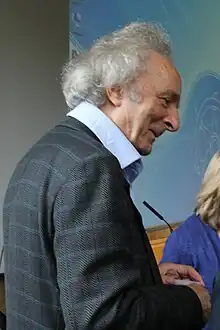Theodore Zeldin
Personal life
Theodore Zeldin was born on the slopes of Mount Carmel on 22 August 1933, the son of Russian-Jewish parents who later chose to become naturalised British subjects. His father was a civil engineer, an expert in bridge-building, a colonel in the Russian Czarist Army, and a socialist who rejected the Bolsheviks. Zeldin's mother was the daughter of an industrialist and she was a dentist who completed her training in Vienna. Escaping from the Russian Civil War, Zeldin's parents emigrated to Palestine, where his father worked for the British Colonial Service building railways. He was disappointed by the failure of the movement for Arab-Jewish solidarity which, together with other scientists and intellectuals, he favoured, and of which the railwaymen's trade union was a vocal advocate.[1] Theodore Zeldin was educated at the English School Heliopolis (a mixed-sex boarding school) and at Aylesbury Grammar School. He graduated from London University (Birkbeck College) at the age of 17 having studied philosophy, history, and Latin and then from Oxford University (Christ Church) studying modern history, with Firsts from both, followed by a doctorate at the newly established St Antony's College in Oxford. He has been a fellow of St Antony's since 1957 (now Emeritus) and was its dean for thirteen years, playing a lead role in developing it as the university's centre for international studies. Now, as an Associate Fellow of Green-Templeton College Oxford, he is active in its Future of Work project.[2]
Zeldin has been elected a Fellow of the British Academy and of the Royal Society of Literature, and is a member of the European Academy. He has been decorated as a Commander of the Order of the British Empire, a Commander of the Légion d'Honneur and a Commander of the Order of Arts and Letters of France. Zelda also holds Britain's top award for History, the Wolfson Prize. He has been married to Deirdre Wilson, the co-inventor of Relevance Theory, since 1975; they live in an Art Deco house outside Oxford. His hobbies are 'gardening, painting and mending things'.[3]
Publications
- The Political System of Napoleon III (1958)[4]
- Edited (with Anne Troisier de Diaz) Émile Ollivier, Journal: 1946-1863 (1961)
- Émile Ollivier and the Liberal Empire of Napoleon III (1963)
- Conflicts in French Society: Anticlericalism, Education and Morals in the Nineteenth Century: Essays (1970)
- France, 1848-1945: Volume I - Ambition, Love and Politics (1973) Volume II - Intellect, Taste and Anxiety (1977) (Oxford History of Modern Europe series). Rearranged and reissued with additional material as:
- History of French Passions: vol 1: Ambition and Love; vol 2: Intellect and Pride; vol 3: Taste and Corruption; vol 4: Politics and Anger; vol 5: Anxiety and Hypocrisy (1979-81)
- The French (1982)
- Foreword to Jeremy Jennings, Georges Sorel: The Character and Development of His Thought (1985)
- Introduction to Le tunnel sous la Manche: chronique d'une passion franco-anglaise (1987)
- Happiness (novel) (1988)
- An Intimate History of Humanity (1994)[5]
- Conversation (2000)
- Guide to an Unknown City (2004)
- Guide to an Unknown University (2006)
- Gary Hill & Gerry Judah (with Jenny Blyth) (2007)
- The Hidden Pleasures of Life: A New Way of Remembering the Past and Imagining the Future (2015)
References
- Z. Lockman, Comrades and Enemies, Arabs and Jewish Workers in Palestine 1906–1948, University of California Press, 1996.
- Editorial on Theodore Zeldin, The Guardian, 16 May 2012
- Who's Who, 2014.
- Kulstein, David I. (June 1959). "Review of The Political System of Napoleon III by Theodore Zeldin". The Journal of Modern History. 31 (2): 134–135. doi:10.1086/238328.
- de Botton, Alain (1 October 1994). "Review of An Intimate History of Humanity by Theodore Zeldin". The Independent. Archived from the original on 7 May 2022.
External links
- The Oxford Muse – Zeldin's website
- Feast of Strangers
- Zeldin talks about "Happiness", ICA 1988
- Theodore Zeldin interview by Máirtín Mac Con Iomaire (Oxford Oral History Project)
